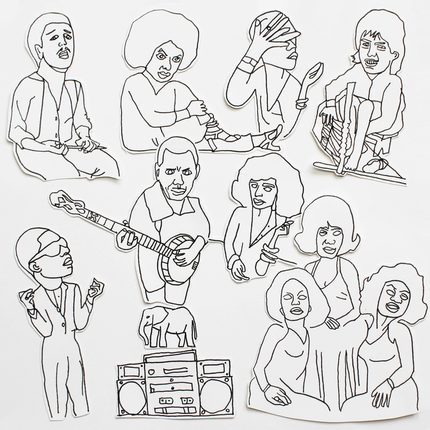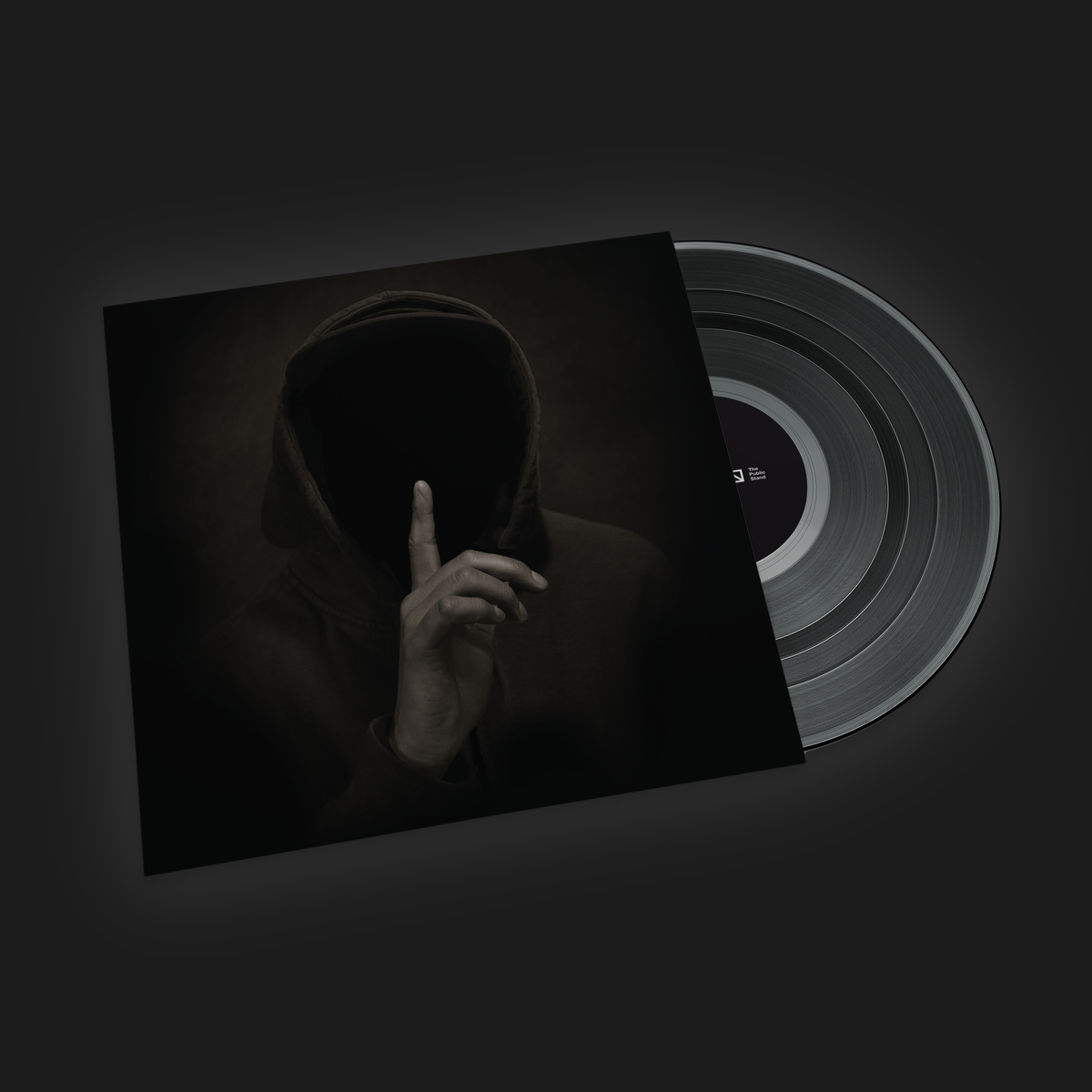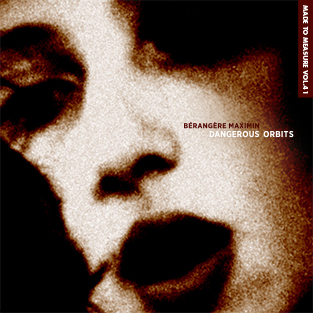theartsdesk on Vinyl: Volume 8 - Björk, Joy Division and more | reviews, news & interviews
theartsdesk on Vinyl: Volume 8 - Björk, Joy Division and more
theartsdesk on Vinyl: Volume 8 - Björk, Joy Division and more
From Nashville garage punk to Dutch techno, the plastic that matters

In October a special tribute will be paid to the late great DJ Frankie Knuckles, the man who defined house music in the 1980s. A former bank In Chicago, now known as the Stony Island Arts Bank, which houses an archive relating to black culture, will be showcasing his gigantic record collection.
All vinyl collections have their own import, personal, biographical and, occasionally, historical. Some of the music below may even be pored over in 40 years time. This month sees a higher percentage than usual of avant-garde experimentalism and, in the case of Liberez, downright cacophonousness, so it's worth reminding that theartsdesk on Vinyl embraces all styles, from chart pop to death metal. Bring it on.
Björk Vulnicura Remix Project Parts One + Two (One Little Indian)
 The first two of Björk’s personally curated collection of reimaginings for this year’s alternately heart-rending and ruminative break-up album, Vulnicura. They arrive in a variety of eye-catching pastel sleeves, each featuring a vaguely vaginal opening based on the imagery that was a talking point of the album’s artwork. All one-sided, on transparent vinyl, each b-side features the titles etched in Vulnicura’s font. There will eventually be three parts, boasting a multiplicity of remixers such as Haxan Cloak, Rabit, Lotic and Kate Gately, however, the three I have are a respectful and not over-lush orchestral take of “Lionsong” by Mica Levi (of Micachu & the Shapes), a doomy, dubstep-touched slow-beats version of “History of Touches” by Kampfhaft, and a “Choral Mix” by Untold which, while utilising a snippet of the Icelandic choir Björk used on her last album, is actually a juddering symphony of wooden-sounding percussion. The whole lot has the personal, very individual touch we’ve come to expect from the woman behind it.
The first two of Björk’s personally curated collection of reimaginings for this year’s alternately heart-rending and ruminative break-up album, Vulnicura. They arrive in a variety of eye-catching pastel sleeves, each featuring a vaguely vaginal opening based on the imagery that was a talking point of the album’s artwork. All one-sided, on transparent vinyl, each b-side features the titles etched in Vulnicura’s font. There will eventually be three parts, boasting a multiplicity of remixers such as Haxan Cloak, Rabit, Lotic and Kate Gately, however, the three I have are a respectful and not over-lush orchestral take of “Lionsong” by Mica Levi (of Micachu & the Shapes), a doomy, dubstep-touched slow-beats version of “History of Touches” by Kampfhaft, and a “Choral Mix” by Untold which, while utilising a snippet of the Icelandic choir Björk used on her last album, is actually a juddering symphony of wooden-sounding percussion. The whole lot has the personal, very individual touch we’ve come to expect from the woman behind it.
Romare Rainbow (Ninja Tune)
 Romare’s debut album, Projections, which appeared in spring this year, is a fascinating deconstruction of disco, taking it apart, piece by piece until it is, in some cases, unrecognizable. This 12” single offers listeners the option of enjoying Romare’s dancefloor side with a version of “Rainbow” that throbs with easy dancefloor groove, somewhere between a stoned Sylvester and a Horsemeat Disco comedown, or an alternate take, the “Bedroom” version, that’s sampledelic, sexed up and Nina-Simone-ish. There’s also a track called “Love Song” which, while not on the album, is more in tune with the style displayed there.
Romare’s debut album, Projections, which appeared in spring this year, is a fascinating deconstruction of disco, taking it apart, piece by piece until it is, in some cases, unrecognizable. This 12” single offers listeners the option of enjoying Romare’s dancefloor side with a version of “Rainbow” that throbs with easy dancefloor groove, somewhere between a stoned Sylvester and a Horsemeat Disco comedown, or an alternate take, the “Bedroom” version, that’s sampledelic, sexed up and Nina-Simone-ish. There’s also a track called “Love Song” which, while not on the album, is more in tune with the style displayed there.
Delia Gonzalez In Remembrance (DFA)
 A heftily packaged release that showcases perfectly the way DFA cross the line between club-flavoured electronica and something more avant-garde. New York's Delia Gonzalez is as much – if not more – an artist than a musician and In Remembrance blossomed from a globally exhibited installation wherein four 16mm ballet films were shown accompanied by stark piano compositions, played by the German classical virtuoso Bernd Sandner. The four pieces are here, unflowery but emotive, as are the films - brown, grainy and weirdly hypnotic - on a DVD attached to an inner sleeve. There’s also - for me the best part – a disc of remixes by Brooklyn’s vanguard electronic experimentalist Bryce Howard, who reconstructs the music as a bubbling pulse that’s midway between techno and Krautrock but very much on the relaxed side of both those.
A heftily packaged release that showcases perfectly the way DFA cross the line between club-flavoured electronica and something more avant-garde. New York's Delia Gonzalez is as much – if not more – an artist than a musician and In Remembrance blossomed from a globally exhibited installation wherein four 16mm ballet films were shown accompanied by stark piano compositions, played by the German classical virtuoso Bernd Sandner. The four pieces are here, unflowery but emotive, as are the films - brown, grainy and weirdly hypnotic - on a DVD attached to an inner sleeve. There’s also - for me the best part – a disc of remixes by Brooklyn’s vanguard electronic experimentalist Bryce Howard, who reconstructs the music as a bubbling pulse that’s midway between techno and Krautrock but very much on the relaxed side of both those.
Joy Division Still + Substance (Warner)
 Two compilations, from 1981 (Still) and 1988 (Substance), receive a lavish re-release. The sonic quality is sturdy and Still is especially well-reproduced in grainy, grey cardboard double sleeving. Substance – which includes the song “Komakino”, sometimes chopped off vinyl editions – efficiently collects the band’s singles, b-sides, EP extras and Factory Records compilation cuts. It is the livelier, more vital album. Still, released the year after singer Ian Curtis’s death, is a collection of then-unreleased studio outtakes, and other odds and ends, as well as a bootleg-rough recording of the band’s final concert (at Birmingham University), including a version of “Ceremony” - later taken on by New Order - where Curtis’s vocals are sadly inaudible. It’s a higgledy piggledy, slapped-together affair yet, oddly, that very aspect retrospectively captures some of the turmoil left in the wake of Curtis’s passing. Substance, although its packaging is less fetishistic, is the more immediate for casual fans.
Two compilations, from 1981 (Still) and 1988 (Substance), receive a lavish re-release. The sonic quality is sturdy and Still is especially well-reproduced in grainy, grey cardboard double sleeving. Substance – which includes the song “Komakino”, sometimes chopped off vinyl editions – efficiently collects the band’s singles, b-sides, EP extras and Factory Records compilation cuts. It is the livelier, more vital album. Still, released the year after singer Ian Curtis’s death, is a collection of then-unreleased studio outtakes, and other odds and ends, as well as a bootleg-rough recording of the band’s final concert (at Birmingham University), including a version of “Ceremony” - later taken on by New Order - where Curtis’s vocals are sadly inaudible. It’s a higgledy piggledy, slapped-together affair yet, oddly, that very aspect retrospectively captures some of the turmoil left in the wake of Curtis’s passing. Substance, although its packaging is less fetishistic, is the more immediate for casual fans.
Liberez All Tense Now Lax (Night School)
 This month seems to be overloaded with dissonance. Perhaps the summer album release dead zone is when the noisies comes out to play. Liberez are a British experimental trio whose music is for the hardy. Those who persist with it, however, may find rewards. Arriving on sturdy, well-mastered vinyl, in a lo-fi black’n’white sleeve, the contents are wilfully discordant, riding a dirge-like tribalistic machine rhythm. Part feedback and part murdered string section (possibly), it alternates between full-on assault and minor key ambient unease with deceptive skill.
This month seems to be overloaded with dissonance. Perhaps the summer album release dead zone is when the noisies comes out to play. Liberez are a British experimental trio whose music is for the hardy. Those who persist with it, however, may find rewards. Arriving on sturdy, well-mastered vinyl, in a lo-fi black’n’white sleeve, the contents are wilfully discordant, riding a dirge-like tribalistic machine rhythm. Part feedback and part murdered string section (possibly), it alternates between full-on assault and minor key ambient unease with deceptive skill.
Dave Cloud and the Gospel of Power Today Is The Day That They Take Me Away (Fire)
 Dave Cloud, who died earlier this year, was one of rock’s niche-avoiding freaks. He spent much of his life, well into his fifties, honing his performance persona at Nashville’s punky alternative venue, the Springwater Supperclub & Lounge (a place I’d recommend everyone spend an evening before they quit this world). His final album is a typically warped effort, part twangy guitar with Iggy Pop-in-ballad-mode vocals, part Tom Waits growling, part Sixties trash, part lo-fi piss-taking and the title track – a highlight – comes on like Locust Abortion Technician-era Butthole Surfers, which is to say it’s wonderfully deranged.
Dave Cloud, who died earlier this year, was one of rock’s niche-avoiding freaks. He spent much of his life, well into his fifties, honing his performance persona at Nashville’s punky alternative venue, the Springwater Supperclub & Lounge (a place I’d recommend everyone spend an evening before they quit this world). His final album is a typically warped effort, part twangy guitar with Iggy Pop-in-ballad-mode vocals, part Tom Waits growling, part Sixties trash, part lo-fi piss-taking and the title track – a highlight – comes on like Locust Abortion Technician-era Butthole Surfers, which is to say it’s wonderfully deranged.
Mr Jones Sounds For The Mute (The Public Stand)
 Mr Jones is Dutch DJ-producer Jonas Uittenbosch, production partner of global techno don Dave Clarke. His debut album holds up two fingers to the recent tendency to define as techno any dance music that’s stripped back, stark and mostly vocal-free. Sounds For The Mute, begins with a bleepy, beatlesss anticipatory suite but is soon into 4/4 kick-drums that brook no argument. Sturdily mastered with real clout in the grooves, sides A and B then move into crunching, juddering machine attack, culminating in the appropriately titled “Truth About Robots”. Sides C and D, however, pull back briefly, offering the listener breathing space before, once again, finishing off with a battering (“Muted”). Proper, no prisoners European techno.
Mr Jones is Dutch DJ-producer Jonas Uittenbosch, production partner of global techno don Dave Clarke. His debut album holds up two fingers to the recent tendency to define as techno any dance music that’s stripped back, stark and mostly vocal-free. Sounds For The Mute, begins with a bleepy, beatlesss anticipatory suite but is soon into 4/4 kick-drums that brook no argument. Sturdily mastered with real clout in the grooves, sides A and B then move into crunching, juddering machine attack, culminating in the appropriately titled “Truth About Robots”. Sides C and D, however, pull back briefly, offering the listener breathing space before, once again, finishing off with a battering (“Muted”). Proper, no prisoners European techno.
Haiku Salut Etch and Etch Deep (How Does It Feel To Be Loved)
 We live, perhaps, in an age when our ability to access every kind of music imaginable renders genres irrelevant. Haiku Salut might agree with that assessment. The female trio mix up live instrumentation with a playful toy-town feel, bell-laden and frothy, alongside electronics and folk-ish elements that recall Icelandic moody ambient types Múm. They are also capable of hauling in a 4/4 beat to push things gently onto the dancefloor. However we wish to categorize it, Haiku Salut’s second album is a chirpy instrumental creature capable of lighting up a smile or two.
We live, perhaps, in an age when our ability to access every kind of music imaginable renders genres irrelevant. Haiku Salut might agree with that assessment. The female trio mix up live instrumentation with a playful toy-town feel, bell-laden and frothy, alongside electronics and folk-ish elements that recall Icelandic moody ambient types Múm. They are also capable of hauling in a 4/4 beat to push things gently onto the dancefloor. However we wish to categorize it, Haiku Salut’s second album is a chirpy instrumental creature capable of lighting up a smile or two.
Bérangère Maximin Dangerous Orbits (Made to Measure/Crammed Discs)
 Bérangère Maximin is a French electro-acoustic composer who once trained with Denis Dufour, the second generation Musique Concrete conceptualist and student of Pierre Schaeffer. She has also been involved with jazz-noise avant-garde-ist John Zorn, for whose Tzadik label she recorded. Dangerous Orbits, then, is not an easy listen. Over three sides – side C is blank – her music, often claustrophobic, harks back to the groundbreaking work of originators such as Edgard Varese, Iannis Xenakis and even, possibly, the Futurist father of them all, Luigi Russolo. Dense, revolving and occasionally sinister, the vinyl version also has meditative depth for those who like to inhabit this kind of fringe sonic exploration.
Bérangère Maximin is a French electro-acoustic composer who once trained with Denis Dufour, the second generation Musique Concrete conceptualist and student of Pierre Schaeffer. She has also been involved with jazz-noise avant-garde-ist John Zorn, for whose Tzadik label she recorded. Dangerous Orbits, then, is not an easy listen. Over three sides – side C is blank – her music, often claustrophobic, harks back to the groundbreaking work of originators such as Edgard Varese, Iannis Xenakis and even, possibly, the Futurist father of them all, Luigi Russolo. Dense, revolving and occasionally sinister, the vinyl version also has meditative depth for those who like to inhabit this kind of fringe sonic exploration.
Also Worthy Of Mention
Morten Qvenild Personal Piano (Hubro): Morten Qvenild is best known as one half of Scandi-alt-pop duo Susanna & the Magical Orchestra but he is also an accomplished jazz pianist. This latest outing, as cleanly and beautifully reproduced as all Hubro records, is an exercise in placing the grand piano in a glitchy, treated framework. It works well, occasionally raucous but mostly lullaby music for heads.
Singers & Players War of Words (On-U Sound): On-U Sound’s continued campaign of reissuing early material is a treat for connoisseurs of post-punk’s fascination with dub reggae. War of Words was not actually on On-U (it was on 99 Records) but it assembled such a team – Bim Sherman, Roots Radics, Keith Levene, Ari Up, etc, produced by Adrian Sherwood – that it might as well have been. Comes with a great black‘n’white double 12” poster.
Seven Davis Jr Universes (Ninja Tune): With Ninja Tune’s relentless attention to detail, this weighty double set offers up their big hope for 2015. Reference points such as Moodymann and Derrick Carter are apt as the Californian wunderkind’s debut emanates slinky electronic suss. Doesn’t quite do it for me, but there’s still something thrusting and funky going on.
- We welcome any and all vinyl for review. Please hit thomash.green@theartsdesk.com for a postal address. Unless otherwise stated, all albums come with a CD or download code, all 7" and 12" singles do not.
Share this article
The future of Arts Journalism
You can stop theartsdesk.com closing!
We urgently need financing to survive. Our fundraising drive has thus far raised £49,000 but we need to reach £100,000 or we will be forced to close. Please contribute here: https://gofund.me/c3f6033d
And if you can forward this information to anyone who might assist, we’d be grateful.

Subscribe to theartsdesk.com
Thank you for continuing to read our work on theartsdesk.com. For unlimited access to every article in its entirety, including our archive of more than 15,000 pieces, we're asking for £5 per month or £40 per year. We feel it's a very good deal, and hope you do too.
To take a subscription now simply click here.
And if you're looking for that extra gift for a friend or family member, why not treat them to a theartsdesk.com gift subscription?
more New music
 Soulwax’s 'All Systems Are Lying' lays down some tasty yet gritty electro-pop
Belgian dancefloor veterans return to the fray with a dark, pop-orientated sound
Soulwax’s 'All Systems Are Lying' lays down some tasty yet gritty electro-pop
Belgian dancefloor veterans return to the fray with a dark, pop-orientated sound
 Music Reissues Weekly: Marc and the Mambas - Three Black Nights Of Little Black Bites
When Marc Almond took time out from Soft Cell
Music Reissues Weekly: Marc and the Mambas - Three Black Nights Of Little Black Bites
When Marc Almond took time out from Soft Cell
 Album: Mobb Deep - Infinite
A solid tribute to a legendary history
Album: Mobb Deep - Infinite
A solid tribute to a legendary history
 Album: Boz Scaggs - Detour
Smooth and soulful standards from an old pro
Album: Boz Scaggs - Detour
Smooth and soulful standards from an old pro
 Emily A. Sprague realises a Japanese dream on 'Cloud Time'
A set of live improvisations that drift in and out of real beauty
Emily A. Sprague realises a Japanese dream on 'Cloud Time'
A set of live improvisations that drift in and out of real beauty
 Trio Da Kali, Milton Court review - Mali masters make the ancient new
Three supreme musicians from Bamako in transcendent mood
Trio Da Kali, Milton Court review - Mali masters make the ancient new
Three supreme musicians from Bamako in transcendent mood
 Hollie Cook's 'Shy Girl' isn't heavyweight but has a summery reggae lilt
Tropical-tinted downtempo pop that's likeable if uneventful
Hollie Cook's 'Shy Girl' isn't heavyweight but has a summery reggae lilt
Tropical-tinted downtempo pop that's likeable if uneventful
 Pop Will Eat Itself's 'Delete Everything' is noisy but patchy
Despite unlovely production, the Eighties/Nineties unit retain rowdy ebullience
Pop Will Eat Itself's 'Delete Everything' is noisy but patchy
Despite unlovely production, the Eighties/Nineties unit retain rowdy ebullience
 Music Reissues Weekly: The Earlies - These Were The Earlies
Lancashire and Texas unite to fashion a 2004 landmark of modern psychedelia
Music Reissues Weekly: The Earlies - These Were The Earlies
Lancashire and Texas unite to fashion a 2004 landmark of modern psychedelia
 Odd times and clunking lines in 'The Life of a Showgirl' for Taylor Swift
A record this weird should be more interesting, surely
Odd times and clunking lines in 'The Life of a Showgirl' for Taylor Swift
A record this weird should be more interesting, surely
 Waylon Jennings' 'Songbird' raises this country great from the grave
The first of a trove of posthumous recordings from the 1970s and early 1980s
Waylon Jennings' 'Songbird' raises this country great from the grave
The first of a trove of posthumous recordings from the 1970s and early 1980s

Add comment